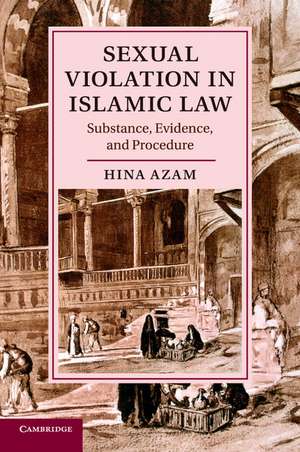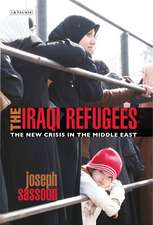Sexual Violation in Islamic Law: Substance, Evidence, and Procedure: Cambridge Studies in Islamic Civilization
Autor Hina Azamen Limba Engleză Paperback – 26 iul 2017
| Toate formatele și edițiile | Preț | Express |
|---|---|---|
| Paperback (1) | 286.51 lei 6-8 săpt. | |
| Cambridge University Press – 26 iul 2017 | 286.51 lei 6-8 săpt. | |
| Hardback (1) | 694.23 lei 6-8 săpt. | |
| Cambridge University Press – 25 iun 2015 | 694.23 lei 6-8 săpt. |
Din seria Cambridge Studies in Islamic Civilization
-
 Preț: 199.99 lei
Preț: 199.99 lei -
 Preț: 289.39 lei
Preț: 289.39 lei - 14%
 Preț: 768.30 lei
Preț: 768.30 lei - 11%
 Preț: 695.06 lei
Preț: 695.06 lei - 19%
 Preț: 572.27 lei
Preț: 572.27 lei - 9%
 Preț: 591.82 lei
Preț: 591.82 lei -
 Preț: 281.30 lei
Preț: 281.30 lei -
 Preț: 185.26 lei
Preț: 185.26 lei - 14%
 Preț: 675.82 lei
Preț: 675.82 lei -
 Preț: 417.25 lei
Preț: 417.25 lei - 11%
 Preț: 693.02 lei
Preț: 693.02 lei -
 Preț: 243.53 lei
Preț: 243.53 lei - 14%
 Preț: 680.53 lei
Preț: 680.53 lei -
 Preț: 328.80 lei
Preț: 328.80 lei -
 Preț: 295.58 lei
Preț: 295.58 lei -
 Preț: 284.17 lei
Preț: 284.17 lei -
 Preț: 408.37 lei
Preț: 408.37 lei -
 Preț: 388.90 lei
Preț: 388.90 lei -
 Preț: 335.34 lei
Preț: 335.34 lei -
 Preț: 326.94 lei
Preț: 326.94 lei -
 Preț: 286.51 lei
Preț: 286.51 lei - 14%
 Preț: 677.47 lei
Preț: 677.47 lei -
 Preț: 208.30 lei
Preț: 208.30 lei - 11%
 Preț: 641.31 lei
Preț: 641.31 lei -
 Preț: 371.83 lei
Preț: 371.83 lei -
 Preț: 375.30 lei
Preț: 375.30 lei - 11%
 Preț: 604.41 lei
Preț: 604.41 lei - 11%
 Preț: 690.27 lei
Preț: 690.27 lei -
 Preț: 324.53 lei
Preț: 324.53 lei - 11%
 Preț: 698.50 lei
Preț: 698.50 lei - 11%
 Preț: 693.36 lei
Preț: 693.36 lei -
 Preț: 207.74 lei
Preț: 207.74 lei -
 Preț: 362.17 lei
Preț: 362.17 lei - 11%
 Preț: 694.38 lei
Preț: 694.38 lei - 11%
 Preț: 690.46 lei
Preț: 690.46 lei - 11%
 Preț: 691.66 lei
Preț: 691.66 lei - 11%
 Preț: 694.23 lei
Preț: 694.23 lei -
 Preț: 389.50 lei
Preț: 389.50 lei -
 Preț: 370.46 lei
Preț: 370.46 lei -
 Preț: 422.96 lei
Preț: 422.96 lei - 14%
 Preț: 733.08 lei
Preț: 733.08 lei
Preț: 286.51 lei
Nou
Puncte Express: 430
Preț estimativ în valută:
54.83€ • 57.17$ • 45.57£
54.83€ • 57.17$ • 45.57£
Carte tipărită la comandă
Livrare economică 20 martie-03 aprilie
Preluare comenzi: 021 569.72.76
Specificații
ISBN-13: 9781107476066
ISBN-10: 1107476062
Pagini: 284
Dimensiuni: 153 x 230 x 18 mm
Greutate: 0.42 kg
Editura: Cambridge University Press
Colecția Cambridge University Press
Seria Cambridge Studies in Islamic Civilization
Locul publicării:New York, United States
ISBN-10: 1107476062
Pagini: 284
Dimensiuni: 153 x 230 x 18 mm
Greutate: 0.42 kg
Editura: Cambridge University Press
Colecția Cambridge University Press
Seria Cambridge Studies in Islamic Civilization
Locul publicării:New York, United States
Cuprins
Introduction; 1. Sexual violation in the Late Antique Near East; 2. Tracing rape in early Islamic law; 3. Rape as a property crime - the Mālikī approach; 4. Rape as a moral transgression - the Ḥanafī approach; 5. Proving rape in Ḥanafī law - substance, evidence, procedure; 6. Proving rape in Mālikī law - evidence, procedure, penalty; Conclusion.
Recenzii
'In Sexual Violation in Islamic Law, Hina Azam combines meticulous attention to formative and classical Ḥanafī and Mālikī jurisprudence with incisive analysis of their implications for contemporary Muslim laws surrounding sexual violence. This groundbreaking study is essential reading for scholars of Islam, law, and gender.' Kecia Ali, Boston University
'Hina Azam's careful analysis of various doctrines of Ḥanafī and Mālikī fiqh have led to important insights regarding deep philosophical differences separating the two schools with respect to sexuality, gender, and violence. By integrating conceptions of gender, property, and theology, Professor Azam has produced a compelling narrative that is not only powerful as an interpretive heuristic, but one that also opens new avenues for research and serves as a model for how gender studies and Islamic law should be conducted by future researchers.' Mohammad Fadel, University of Toronto
'Hina Azam's meticulous readings of classical texts are framed in a wide-ranging analysis with implications far beyond the issue of sexual violence. Although firmly centered on pre-modern legal discourses, the book trenchantly demonstrates their relevance to ongoing debates. Required reading for anyone interested in the history of gender and Islamic law.' Marion Katz, New York University
'Hina Azam's book is a tour de force on the early history of sexual violation in Islam. Debates on penalties attached to crimes of rape in some contemporary majority Muslim societies are derived from early Islamic precedents and practices. Prior to Sexual Violation in Islamic Law some of these debates were shrouded in arcane debates and unreachable texts for many. In lucid prose and elegant presentation, Azam provides an accessible historic overview of internal debates among legal scholars that are now available to the broader reading public. Her vital insights will cast a guiding light for those interested in debates on gender, sexuality, and ethics as well as the sexual practices in the Near East in a comparative context.' Ebrahim Moosa, University of Notre Dame, Indiana
'Hina Azam takes on contemporary practices of Islamic law that work against rape victims through a revisiting of late antique and medieval legal discourses. Her meticulous approach yields ample material for rethinking some of the more injurious aspects of current legal interpretations and sounds a compelling call for gender justice grounded in the Islamic legal tradition. An exemplary work of engaged scholarship.' Judith Tucker, Georgetown University, Washington DC
'Hina Azam's careful analysis of various doctrines of Ḥanafī and Mālikī fiqh have led to important insights regarding deep philosophical differences separating the two schools with respect to sexuality, gender, and violence. By integrating conceptions of gender, property, and theology, Professor Azam has produced a compelling narrative that is not only powerful as an interpretive heuristic, but one that also opens new avenues for research and serves as a model for how gender studies and Islamic law should be conducted by future researchers.' Mohammad Fadel, University of Toronto
'Hina Azam's meticulous readings of classical texts are framed in a wide-ranging analysis with implications far beyond the issue of sexual violence. Although firmly centered on pre-modern legal discourses, the book trenchantly demonstrates their relevance to ongoing debates. Required reading for anyone interested in the history of gender and Islamic law.' Marion Katz, New York University
'Hina Azam's book is a tour de force on the early history of sexual violation in Islam. Debates on penalties attached to crimes of rape in some contemporary majority Muslim societies are derived from early Islamic precedents and practices. Prior to Sexual Violation in Islamic Law some of these debates were shrouded in arcane debates and unreachable texts for many. In lucid prose and elegant presentation, Azam provides an accessible historic overview of internal debates among legal scholars that are now available to the broader reading public. Her vital insights will cast a guiding light for those interested in debates on gender, sexuality, and ethics as well as the sexual practices in the Near East in a comparative context.' Ebrahim Moosa, University of Notre Dame, Indiana
'Hina Azam takes on contemporary practices of Islamic law that work against rape victims through a revisiting of late antique and medieval legal discourses. Her meticulous approach yields ample material for rethinking some of the more injurious aspects of current legal interpretations and sounds a compelling call for gender justice grounded in the Islamic legal tradition. An exemplary work of engaged scholarship.' Judith Tucker, Georgetown University, Washington DC
Notă biografică
Descriere
Centered on legal discourses of Islam's first six centuries, this book analyzes juristic writings on the topic of rape.















